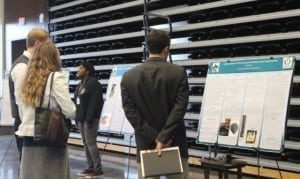Center for Advanced Technical Studies hosts statewide clean energy showcase
December 3, 2015CHAPIN, SC – Expanding clean energy course offerings was the focus of a recent statewide conference at the Center for Advanced Technical Studies.
The Lexington-Richland District Five school hosted the Southern Regional Education Board’s Clean Energy Showcase for educators, administrators and students from around the state. The Dec. 1 event at The Center included panel discussions with students, administrators, guidance counselors and teachers as well as classroom visitations and one-on-one discussions with students on clean energy projects.
SREB leaders say Clean Energy course offerings have increased exponentially nationwide since the group piloted its curriculum at The Center in 2012.
“We started off with a handful of sites, and now we have 81 sites across the country. We are in 18 different states with the Advanced Career (AC) programs, and we are growing fast,” said Zachary Riffell, Southern Regional Education Board Co-Director, Advanced Career: Marketing. “We created the showcase to put the students’ projects on full display and show others what’s possible when Clean Energy and other Advanced Career programs are implemented in schools.”
Opened in 2012, the Center for Advanced Technical Studies (The Center) provides a standalone facility for students to build technical skills, gain certifications and earn college credits. Attended by students from District Five’s four high schools, The Center offers high tech courses in a wide variety of areas from biomedical science and auto mechanics to clean energy and welding.
The Center has offered Clean Energy Technology curriculum at the school since it opened, serving as a training site for other schools wanting to implement similar courses. In the course students manufacture and test biofuels and explore sources of renewable energy including solar and wind. Student-led research projects are entered into local and regional science fairs, and earlier this year a student in the course earned a South Carolina Young Innovator of the Year award for his project to advanced underwater turbines.
“Clean Energy Technology as a curriculum topic is not currently addressed alongside most other curricula that’s out there, but it’s critically important to expose students to this course and have them look at creative and innovative ways to provide fuel, energy and power for people in the future,” said Patrick Smallwood, instructor for the Clean Energy Technology program at The Center. “In our course students get exposed to issues related to energy production, clean energy technologies and sustainability. They also learn to innovate, create, think critically, design and problem-solve…all skills that are super powerful for them regardless of what they do after high school.”
Tyler Wrenn, who received the 2015 Ibrahim Janajreh Young Innovator Award during a ceremony in Greenville in November, said clean energy should be a topic of interest for all students.
“We will have to address our energy issues one day, and that day is sooner than we think,” Wrenn said. “The Clean Energy courses here have definitely opened my eyes to the accessibility to the clean energy we have and just how easy it is to get to a sustainable state. Throughout the three years that I’ve been here, I’ve seen the Clean Energy course grow substantially throughout the nation and here at the school.”
SREB is offering 100 training grants to schools that adopt an Advanced Career curriculum in school year 2016-17. Officials with the group say SREB’s Advanced Career (AC) STEM- and project-based Clean Energy Technology curriculum teaches students to apply science and math skills and engineering processes to solve the world’s pressing power needs. Showcases and grants help create interest in the programs, highlighting all the advantages that come with Advanced Career courses, organizers said.
“The students here in the clean energy class are learning to find solutions for our energy issues, but they are also learning how to tackle real-world problems and to develop those skills they’ll need later in life,” Riffell said. “A lot of the students that take this course are interested in continuing into some type of engineering track, but even the students that aren’t are learning skills that will make them successful. They’ve found a way to be successful here at the Center for Advanced Technical Studies.”













